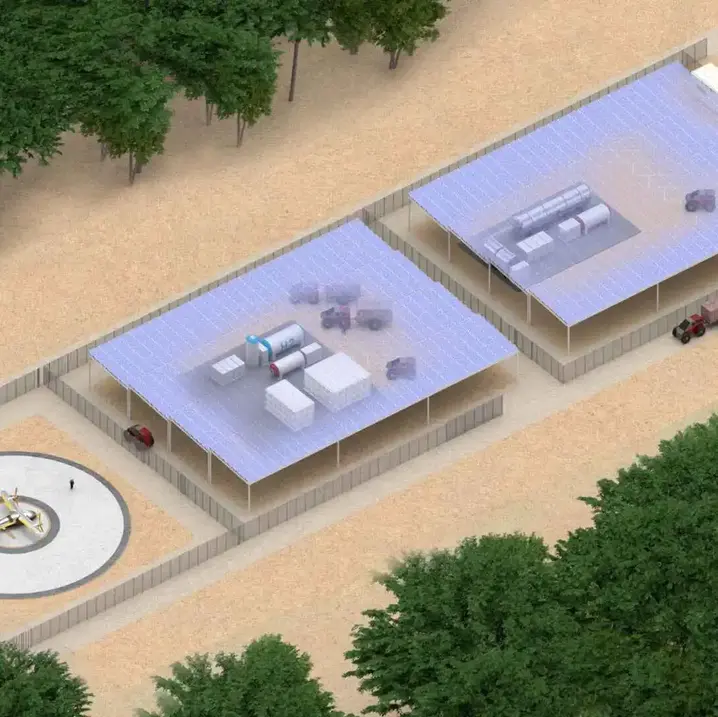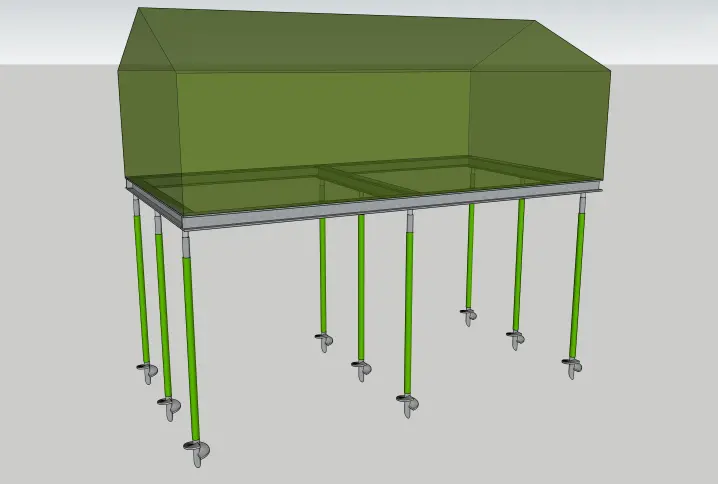
PROJECTS
While we’re bound by NDAs and cannot name specific customers, the following are representative highlights of multi-deployment initiatives we've delivered across defense, enterprise, and telecom sectors. These projects showcase the flexibility and scalability of our modular infrastructure—built to meet the needs of AI, national security, and critical enterprise workloads.

We've built out high-density designs supporting GPU-as-a-Service (GPUaaS) platforms using NVIDIA Hopper GPUs at 40kW per rack. These are engineered for large-scale AI training and inference with integrated cooling, power, and orchestration.
These modular systems are designed for rapid deployment and future-proof for Blackwell, with the flexibility to support AMD and Intel-based accelerators. Whether cloud-adjacent or behind the firewall, we're helping teams move faster, scale smarter, and stay ready for what's next.
GPU-as-a-Service (GPUaaS)
- AI-Ready Infrastructure at Scale
We've built out high-density designs supporting GPU-as-a-Service (GPUaaS) platforms using NVIDIA Hopper GPUs at 40kW per rack. These are engineered for large-scale AI training and inference with integrated cooling, power, and orchestration.
These modular systems are designed for rapid deployment and future-proof for Blackwell, with the flexibility to support AMD and Intel-based accelerators. Whether cloud-adjacent or behind the firewall, we're helping teams move faster, scale smarter, and stay ready for what's next.
U.S. DoD + Allied Defense Forces
- Tactical SCIF Deployments
In collaboration with the U.S. Department of Defense and allied military partners, we've built SCIF-compliant, deployable 20x8 and 40x8 modular systems and fixed data centers outfitted with racks, workstations, storage, etc. These hardened, secure deployments support distributed C2, ISR processing, and mission-critical applications. Purpose-built for rugged, forward environments, these systems can be scaled, redeployed, or reconfigured as missions evolve. These can also be contracted under DLA, enabling O&M, RTD&E, 3600 funds, etc., to be used instead of MILCON dollars, enabling quick deployments for our warfighters.
In collaboration with the U.S. Department of Defense and allied military partners, we've built SCIF-compliant, deployable 20x8 and 40x8 modular systems and fixed data centers outfitted with racks, workstations, storage, etc. These hardened, secure deployments support distributed C2, ISR processing, and mission-critical applications. Purpose-built for rugged, forward environments, these systems can be scaled, redeployed, or reconfigured as missions evolve. These can also be contracted under DLA, enabling O&M, RTD&E, 3600 funds, etc., to be used instead of MILCON dollars, enabling quick deployments for our warfighters.


Enterprise Data Center Replacement
- Fortune 50 Initiative
For a major Fortune 50 enterprise, we are rolling out a fleet of modular data center replacements, transitioning from aging stick-built infrastructure to modern data center facilities to enable multi and hybrid cloud. These deployments are designed to integrate into hybrid IT architectures, reduce PUE, and support rapid scaling of core and edge workloads. The result is a distributed, agile, and more resilient enterprise backbone.
For a major Fortune 50 enterprise, we are rolling out a fleet of modular data center replacements, transitioning from aging stick-built infrastructure to modern data center facilities to enable multi and hybrid cloud. These deployments are designed to integrate into hybrid IT architectures, reduce PUE, and support rapid scaling of core and edge workloads. The result is a distributed, agile, and more resilient enterprise backbone.
Deployable Disaster Recovery - Fortune 50 Telecom
We've built DR site deployments for a Fortune 50 telecom firm, building mobile, high-availability network nodes to safeguard mission-critical services. These hardened systems are pre-integrated with core applications and can be activated in the field within days. Each site includes computing, storage, and networking and is designed to maintain telecom-grade SLAs in adverse conditions.

We've built DR site deployments for a Fortune 50 telecom firm, building mobile, high-availability network nodes to safeguard mission-critical services. These hardened systems are pre-integrated with core applications and can be activated in the field within days. Each site includes computing, storage, and networking and is designed to maintain telecom-grade SLAs in adverse conditions.


Compute-Enabled Intermediate Line Amplifier (ILA) Sites
Traditionally, ILAs are passive components that boost signal strength across the long-haul fiber. We've transformed their design to enable quick deployments using minimal skilled labor. These use our composite solution and can meet any local snow, wind, and seismic load along with fire codes and health and safety regulations – plus a lifespan greater than 50 years with zero maintenance, lowering overall TCO. We have also taken this design further and turned them into edge inference nodes, embedding AI compute capabilities directly next to these ILA huts. These hybrid deployments now act as backhaul amplifiers and localized inference engines, bridging core networks and distributed sensors. Combining fronthaul and backhaul enables real-time decision-making at the edge, with reduced reliance on centralized computing. These are also using sustainable micro grids for locations where power is inaccessible.
Traditionally, ILAs are passive components that boost signal strength across the long-haul fiber. We've transformed their design to enable quick deployments using minimal skilled labor. These use our composite solution and can meet any local snow, wind, and seismic load along with fire codes and health and safety regulations – plus a lifespan greater than 50 years with zero maintenance, lowering overall TCO. We have also taken this design further and turned them into edge inference nodes, embedding AI compute capabilities directly next to these ILA huts. These hybrid deployments now act as backhaul amplifiers and localized inference engines, bridging core networks and distributed sensors. Combining fronthaul and backhaul enables real-time decision-making at the edge, with reduced reliance on centralized computing. These are also using sustainable micro grids for locations where power is inaccessible.



